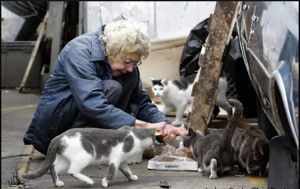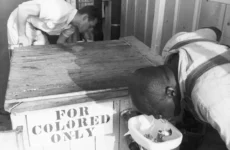
In Niagara Falls, under Council woman Kristen Grandinetti’s proposed legislation, someone who left an open can of Friskies on the back steps at night would be risking fines and jail time.
This week the Niagara Falls City Council tabled legislation introduced by Council member Kristen Grandinetti that would have tightened regulations for cat owners in the city, and made feeding a stray cat a criminal offense.
Grandinetti’s bill seeks to amend Chapter 701 of the Codified City Ordinances, which governs ownership of dogs, cats and other animals.
Most of the changes she recommends have to do with cats.
“No cat shall be fed, sheltered, maintained or harbored that is not domesticated,” Grandinetti’s proposed new rules state. “No person shall harbor, maintain or feed any unlicensed or stray cat.”
Under the new rules, cats would no longer be permitted to “interfere with garbage receptacles,” or to “defecate, urinate or dig” on any property not belonging to the cat owner.
Exactly what constitutes a “domesticated” cat is not spelled out.

Many animal activists feed feral cats believing it is humane to do so. Are they enabling an exploding cat population?
Additionally, there is currently no provision for licensing cats in Niagara County, and it is uncertain whether Grandinetti’s legislation is designed to open the door for licensing in the city.
In any event, she’s also provided a mechanism that would allow neighbors to inform on one another.
“Any person who observes or has knowledge of a cat violating any provision of this chapter may file a signed complaint under oath with the animal control officer or the city specifying the objectionable conduct of the cat and the name and address, if known, of the person harboring said cat.”
The new rules are replete with penalties for non-compliance, with fines of up to $250 and jail sentences of up to 15 days for repeat violations.
Last September, Amy Lewis, Niagara County Director of Niagara County Society for the Prevention of Cruelty to Animals, made headlines when she took to the airwaves to make a startling claim. There are more feral cats, 60,000, in the city of Niagara Falls than there are people, [49,000] she stated. While many doubted her allegation, she never took it back.
In a national survey by the Humane Society of the United States, it is estimated there 60-100 million feral cats in the U.S., with approximately 17 million people feeding about half of them.
Grandinetti’s proposed rule change flies in the face of much recent legislation designed to protect animals and enhance animal rights. In New York, a bill is currently making its way through the state Legislature that would make cat declawing illegal, for example.
Many animal activists feed stray and feral cats employing a method known as TNVR [Trap, Neuter, Vaccinate and Release], a process which is meant to ultimately reduce feral cat populations. Many, if not most animal activists believe in feeding the released feral cats after they are neutered.
This would be illegal under Grandinetti’s proposal.




















